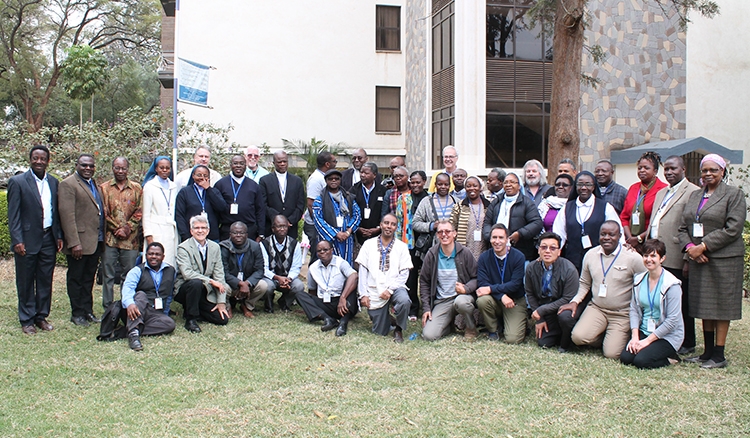 During the summer of 2017, the scholars involved in creating "The Handbook of African Catholicism" met for the first time at a three-day conference at Hekima University in Nairobi, Kenya. (Image courtesy of Karen Kraft)
During the summer of 2017, the scholars involved in creating "The Handbook of African Catholicism" met for the first time at a three-day conference at Hekima University in Nairobi, Kenya. (Image courtesy of Karen Kraft)
For more than a year,
DePaul's Center for World Catholicism and Intercultural Theology has worked with 50 international scholars to create "The Handbook of African Catholicism," a resource guide on the history and practices of Catholicism in Africa. Now in its final stages, organizers of the project hope to complete the book next year.
"Nothing like this exists yet," says Karen Kraft, the communications and publications project manager for the CWCIT. "It's been a lot of work, but we're excited to be a part of creating this important resource."
Founded in 2008 and housed in the Department of Catholic Studies, the CWCIT seeks to be at the forefront of the discussion on the relationship between globalization and the Catholic Church's future as a truly worldwide church.
Made possible by a private grant given to the CWCIT, organizers began development of the project in 2016. Each of the more than 50 scholars involved are contributing a chapter to the handbook, detailing specific areas of research and expertise. Once complete, the book will provide a review of various topics and disciplines under the umbrella of Catholicism and theology in Africa. Many of the topics were contested for decades and are only now being openly discussed.
"The handbook is wide-ranging in scope and interdisciplinary in approach; we hope it will have a far-reaching impact for African Christianity and the world church," says Stan Chu Ilo, project coordinator and research professor at CWCIT in Catholic Studies at DePaul. "We'd like the book to stand as a marker for the status of scholarship in religious and Catholic studies, theology and philosophy in the ecclesiastical studies on the African continent."
In addition to the benefits of developing a go-to academic resource on Catholicism in Africa, the project also has created a network of support for the scholars involved. During the summer of 2017, those involved with the project met for the first time at a three-day conference at Hekima University in Nairobi, Kenya. Though many of the scholars had previously corresponded via letter, phone or email, this project brought everyone together and further solidified their relationships as colleagues and mutual resources.
During the conference, participants pointed to the social mission of African Christian women in grassroots development, and their work of reconciliation and humanitarian intervention in civil conflict. They also reported on the exponential growth in the Catholic population in Africa, and that in many parts in Africa, the Catholic Church has become the strongest instrument for social, economic and political development.
"The contributors represent the leading minds in the discipline across Africa and the rest of the world," Ilo says. "As Catholicism continues to grow across Africa, we felt it was important for the handbook to address all avenues of investigation and for these scholars to develop a network of resources for their future scholastic endeavors."
Working under the guidance of Bill Cavanaugh, the director of the CWCIT, and senior research professor Michael Budde, Ilo and Kraft are currently editing the chapters and organizing them into a cohesive book. The coordinators look forward to completing the project and sharing their work not only with the contributing scholars, but also with the Catholic academy and the world church.
"Ultimately, this book helps fulfill the CWCIT's mission to produce research and contribute to a fuller understanding of Catholicism across the globe," Kraft says."